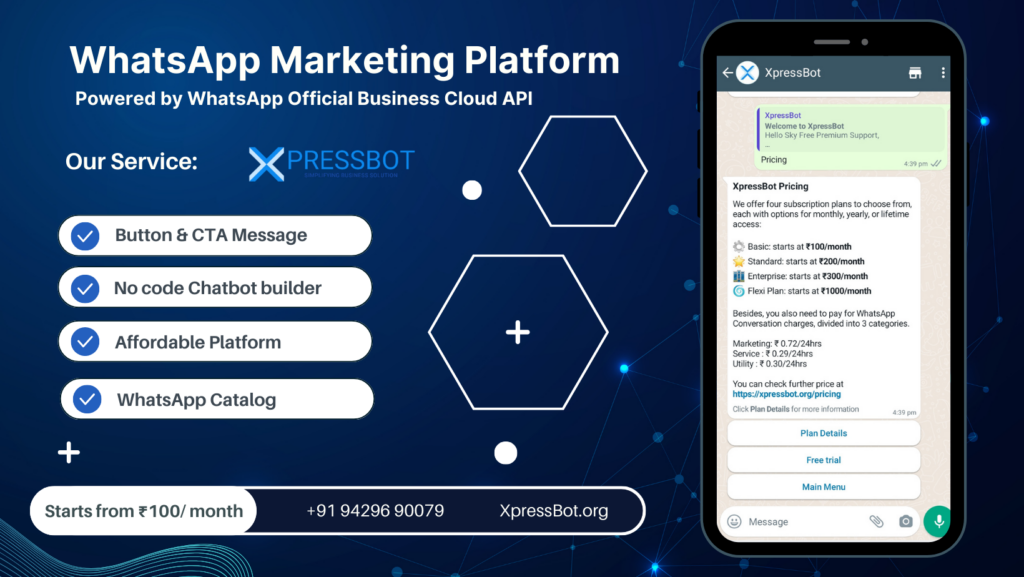The effectiveness of WhatsApp versus email marketing depends on various factors, including your target audience, the nature of your message, and your marketing goals. Here’s a comparison:
- Reach and Engagement: WhatsApp is a more personal and immediate communication channel compared to email. People tend to check their WhatsApp messages more frequently and respond faster. However, email allows for more extensive content and can reach a broader audience, including those who might not be on WhatsApp.
- Cost: WhatsApp generally involves lower costs compared to email marketing, especially for international communication. WhatsApp Business API, however, might incur costs based on message volume.
- Targeting: With WhatsApp, you can target specific individuals or groups directly, making it highly personalized. Email marketing platforms also offer segmentation and personalization features but may not have the same immediacy as WhatsApp.
- Content Format: WhatsApp supports various media types, including text, images, videos, and documents. While email also supports these formats, there might be limitations on file sizes and types.
- Regulations and Compliance: Email marketing is subject to various regulations like GDPR, CAN-SPAM Act, etc., which require explicit consent and opt-out mechanisms. WhatsApp also has its policies and terms of service, and businesses need to ensure compliance with regulations when using it for marketing.
- Analytics and Tracking: Email marketing platforms provide detailed analytics, including open rates, click-through rates, conversions, etc. WhatsApp Business API also offers some analytics, but it may not be as comprehensive as email.
- Automation: Both WhatsApp and email marketing can be automated to some extent. However, email marketing platforms often offer more sophisticated automation features like drip campaigns, autoresponders, etc.
Benefits of Whats app Marketing:
Direct and Personal Communication: WhatsApp allows businesses to communicate with customers directly on their smartphones. This direct line of communication feels more personal and can lead to stronger customer relationships.
High Engagement Rates: People tend to check their WhatsApp messages frequently, leading to high open and response rates. This can result in better engagement with your marketing messages compared to other channels.
Instant Communication: WhatsApp messages are delivered instantly, making it an effective channel for time-sensitive promotions, updates, and customer support.
Rich Media Support: WhatsApp supports various media types, including text, images, videos, documents, and even voice messages. This enables businesses to create engaging and interactive content to capture customers’ attention.
Cost-Effective: Compared to traditional forms of marketing like SMS or direct mail, WhatsApp marketing can be more cost-effective, especially for international communication.
Targeted Marketing: With WhatsApp, businesses can target specific individuals or groups with personalized messages, offers, and promotions, leading to higher conversion rates.
Customer Service and Support: WhatsApp can be used for providing customer service and support, allowing businesses to address customer queries and issues in real-time, enhancing customer satisfaction.
Opt-in Communication: Since WhatsApp requires users to opt-in to receive messages from businesses, it ensures that your marketing messages are reaching an audience that is genuinely interested in your products or services.
Analytics and Insights: WhatsApp Business API provides some analytics and insights into message delivery, read receipts, and response rates, allowing businesses to measure the effectiveness of their marketing campaigns.

Benefits of Email Marketing:
Email marketing offers numerous benefits for businesses:
- Wide Reach: Email allows you to reach a large audience instantly. With billions of email users worldwide, you can connect with potential customers across different demographics and geographical locations.
- Cost-Effective: Compared to traditional marketing channels like print or television advertising, email marketing is relatively inexpensive. There are often no printing or postage costs, and email marketing platforms offer affordable subscription plans.
- Targeted Communication: Email marketing platforms allow you to segment your audience based on demographics, behaviors, or interests. This targeted approach enables you to tailor your messages to specific groups, increasing relevance and engagement.
- Personalization: Personalized emails have higher open and click-through rates. Email marketing platforms provide tools for personalizing emails with recipients’ names, preferences, past purchases, and more, creating a more personalized experience for subscribers.
- Measurable Results: Email marketing provides detailed analytics and insights into campaign performance. You can track metrics such as open rates, click-through rates, conversion rates, and more, allowing you to measure the effectiveness of your campaigns and make data-driven decisions.
- Automation: Email marketing platforms offer automation features that allow you to schedule emails in advance, set up drip campaigns, send automated responses, and more. Automation saves time and allows you to nurture leads and engage with customers consistently.
- Brand Building: Consistent and well-designed email campaigns help reinforce your brand identity and keep your brand top-of-mind with subscribers. By delivering valuable content and offers, you can build trust and credibility with your audience over time.
- Drive Sales and Conversions: Email marketing is an effective channel for driving sales and conversions. You can promote products, announce promotions and discounts, and send targeted offers to encourage subscribers to make purchases.
- Easy to Share and Forward: Subscribers can easily forward your emails to friends, family, or colleagues, extending your reach and potentially attracting new subscribers and customers through word-of-mouth referrals.
- Compliance and Control: Email marketing is subject to regulations such as GDPR and CAN-SPAM Act, which require businesses to obtain consent from subscribers and provide opt-out options. Adhering to these regulations helps build trust and ensures compliance with legal requirements.

